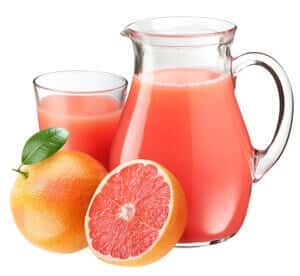
Are you taking your medicine correctly? Or are you wasting good money by swallowing your pills with food that can counteract their benefits?
Millions of people make mistakes without realizing it. In some cases that may mean a sinus infection won’t get better. In others, a deadly overdose could result from the wrong combination of food and drugs.
The Case of the Dangerous Bran Muffins
Who would ever imagine that bran muffins could lead to suicide?
We were intrigued to read about the 42-year-old woman who, like her father, had suffered from severe depression. Over nine years she had four bad bouts of the blues that required antidepressant therapy. Her psychiatrist had prescribed 75 mg of desipramine (Norpramin) with excellent results.
The physician was puzzled when her patient didn’t improve on this drug a fifth time. The dose was the same but after three weeks the patient wasn’t getting any better. Blood tests revealed that less than half the usual amount of desipramine was circulating in her body; this was too little to be effective.
Upon questioning, the patient said her family doctor had recommended bran to overcome constipation. She was eating only a bran muffin at breakfast and another at lunch. The fiber dramatically interfered with the absorption of her medicine. Thanks to an alert psychiatrist, the patient gave up the muffins, her blood levels returned to normal, and the depression soon lifted (Journal of Clinical Psychopharmacology, 1992; 12: 438-440).
Grapefruit Juice Packs a Wallop
Grapefruit has a completely different impact on certain medications. Blood levels of many medicines may rise dramatically when people consume grapefruit.
We started writing about this problem over 20 years ago because we felt it was too important to ignore. At first, many health professionals laughed at us. The Food and Drug Administration was slow to warn physicians, patients and pharmacists about grapefruit-drug interactions. Now it is a well-recognized problem that requires caution. At last count over 80 medications interact with grapefruit. Here are just a few examples:
- The anti-anxiety drug buspirone (BuSpar) is affected by grapefruit juice.
- So is the anticonvulsant carbamazepine (Tegretol).
- Cholesterol-lowering statin-type drugs such as atorvastatin (Lipitor), lovastatin (Mevacor) and simvastatin (Zocor) are all affected in a substantial way by grapefruit.
- The powerful heart medicine amiodarone (Cordarone, Nexterone) may become more dangerous with grapefruit on board.
Deadly Grapefruit Interaction
Perhaps the most tragic report we have come across was that of a young man who died as a consequence of combining the antihistamine terfenadine (Seldane) and grapefruit juice. He was in good health except for allergies that prompted his physician to prescribe the nonsedating antihistamine.
He liked grapefruit juice and drank it several times a week. The day he died he consumed two glasses of grapefruit juice as well as his medicine. The cause of death was determined to be terfenadine intoxication, even though he had taken his usual dose. His blood levels of terfenadine were as high as those seen in other people who experienced fatal irregular heart rhythms due to Seldane overdose.
It took a long time for the FDA to recognize that grapefruit interactions with medicines required serious attention. Seldane was ultimately banned, primarily because physicians and pharmacists did not seem to be able to warn people adequately or prevent the drug from interacting dangerously with other medications or with grapefruit.
Food’s impact on medicines in general has gotten short shrift from the agency. It is much easier for drug companies to test their medications on an empty stomach. Rarely do they test for specific food or supplement interactions.
Although patients want to know how best to take their medicines and what foods or herbs to avoid, often their physicians can’t give them that information because it is not readily available
If you would like an overview of these problems you may wish to download our free guides:
Please understand that these guides merely scratch the surface and are not meant as the final word on such interactions. They are a starting place for more information.
Avoid Deadly Drug Interactions
There is a dirty little secret in medicine and pharmacy that is rarely discussed. It is called alert fatigue. Doctors get so tired of seeing drug interaction warnings on their computer or smart phone that they often ignore or override the alerts. The same thing happens in the pharmacy.
If you ever hang out in a drug store for more than a few minutes, you will discover that most people grab and go. That is, they grab their bag of medicines and head for the door. They are in such a hurry that they rarely bother to ask the pharmacist how to take their medicine. Should those pills be taken with food or on an empty stomach? Are there certain foods or beverages that might pose a problem?
What that means is that every day patients are prescribed and dispensed medications that may be incompatible with food or other drugs they are taking. We have three chapters about these concerns. They are:
Chapter 6: Top Screwups Doctors Make when Prescribing
Chapter 7: Drug Interactions Can Be Deadly
Chapter 8: Top 10 Screwups Pharmacists Make
You will find this information in our book, Top ScrewUps Doctors Make and How to Avoid Them.
Doctors would be justifiably distressed if the pills dispensed to their patients contained only half as much medicine as they should–or if they contained three or four times more than anticipated. This is the effect that certain food-drug interactions can have, and physicians should be informed so that they can adjust the dose accordingly.
Until the FDA gives physicians and pharmacists more complete information, and these professionals communicate interaction warnings effectively, patients will have to watch out for themselves. One first step would be to download our free guides on interactions and consider our book on Top Screwups.

